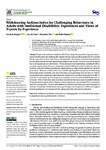Withdrawing Antipsychotics for Challenging Behaviours in Adults with Intellectual Disabilities: Experiences and Views of Experts by Experience
| dc.contributor.author | de Kuijper, Gerda | |
| dc.contributor.author | de Haan, J | |
| dc.contributor.author | Deb, Shoumitro | |
| dc.contributor.author | Shankar, Rohit | |
| dc.date.accessioned | 2022-11-28T09:51:09Z | |
| dc.date.available | 2022-11-28T09:51:09Z | |
| dc.date.issued | 2022-12 | |
| dc.identifier.issn | 1661-7827 | |
| dc.identifier.issn | 1660-4601 | |
| dc.identifier.other | ARTN 15637 | |
| dc.identifier.uri | http://hdl.handle.net/10026.1/20017 | |
| dc.description.abstract |
<jats:p>People with intellectual disabilities (PwID) are frequently prescribed long-term antipsychotics for behaviours that challenge (BtC) despite the lack of proven effectiveness and the increased risks for side effects of these medications in this population. National and international good clinical practice guidelines recommend deprescribing antipsychotics for BtC, which is often not successful due to environmental and other factors. The involvement of all stakeholders, including PwID, is crucial for deprescribing. However, studies showed that PwID and/or their families are often not involved in decision-making regarding the (de)prescribing of antipsychotics despite their desire to get involved. Moreover, studies on the views of PwID regarding their experiences of withdrawing from antipsychotics are lacking. The aim of this study was to gain insight into the views of PwID by investigating their experiences of discontinuation of long-term prescribed antipsychotics for BtC. A qualitative study was set up. Seven experts by experience with mild intellectual disabilities were interviewed. After six interviews, data saturation was achieved. Interviews were transcribed verbatim. Using phenomenological analysis, themes on lived experiences were extracted. Each consecutive interview was analysed. The four main themes extracted from the interviews were the quality of treatment, knowledge and information about psychotropics and the process of withdrawal, support from the participants’ environment and the coping style of the interviewees themselves.</jats:p> | |
| dc.format.extent | 15637-15637 | |
| dc.format.medium | Electronic | |
| dc.language | en | |
| dc.language.iso | en | |
| dc.publisher | MDPI AG | |
| dc.subject | intellectual disabilities | |
| dc.subject | antipsychotics | |
| dc.subject | challenging behaviour | |
| dc.subject | discontinuation | |
| dc.subject | experts by experience views | |
| dc.subject | qualitative study | |
| dc.subject | interviews | |
| dc.title | Withdrawing Antipsychotics for Challenging Behaviours in Adults with Intellectual Disabilities: Experiences and Views of Experts by Experience | |
| dc.type | journal-article | |
| dc.type | Journal Article | |
| plymouth.author-url | https://www.webofscience.com/api/gateway?GWVersion=2&SrcApp=PARTNER_APP&SrcAuth=LinksAMR&KeyUT=WOS:000896544700001&DestLinkType=FullRecord&DestApp=ALL_WOS&UsrCustomerID=11bb513d99f797142bcfeffcc58ea008 | |
| plymouth.issue | 23 | |
| plymouth.volume | 19 | |
| plymouth.publication-status | Published online | |
| plymouth.journal | International Journal of Environmental Research and Public Health | |
| dc.identifier.doi | 10.3390/ijerph192315637 | |
| plymouth.organisational-group | /Plymouth | |
| plymouth.organisational-group | /Plymouth/Faculty of Health | |
| plymouth.organisational-group | /Plymouth/Users by role | |
| dc.publisher.place | Switzerland | |
| dcterms.dateAccepted | 2022-11-22 | |
| dc.identifier.eissn | 1660-4601 | |
| dc.rights.embargoperiod | Not known | |
| rioxxterms.versionofrecord | 10.3390/ijerph192315637 | |
| rioxxterms.licenseref.uri | http://www.rioxx.net/licenses/all-rights-reserved | |
| rioxxterms.type | Journal Article/Review |


